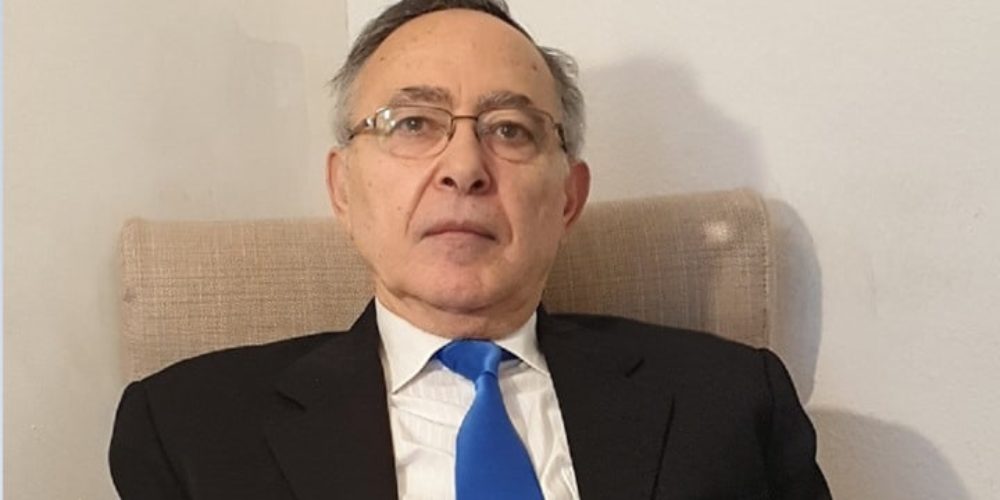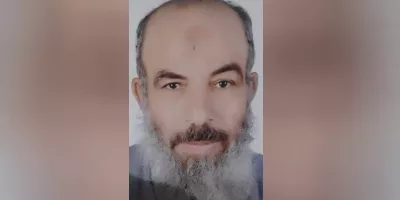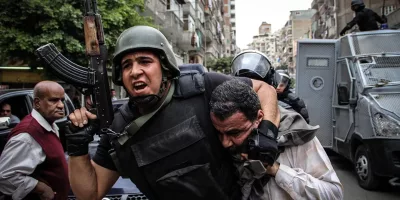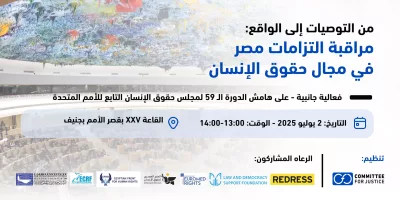News briefing: Translation and editing by: Committee for Justice
Geneva, 2 December 2020
A group of UN human rights experts have expressed their concern about Egypt’s Terrorism Circuit Courts, due to allegations of their incompatibility with international due process guarantees as well as alleged violations of fundamental rights of many individuals, including human rights defenders who have been tried, or are still awaiting to be tried, before these courts.
The case of Bahey El-Din Hassan as an example:
The experts have expressed their concern – in particular – about the case of human rights defender Bahey El-Din Hassan, the founder and director of the Cairo Institute for Human Rights Studies (CIHRS), who had recently been convicted in absentia by the Terrorism Circuit Court to 15 years imprisonment in apparent reprisals for his cooperation with the United Nations on human rights issues.
In a memorandum sent to the Egyptian authorities on October 2, 2020, which has not received a response yet, the experts raised their concerns about Egypt’s counter-terrorism legislation, specifically in relation to the broad and conflated definition of terrorism contained within it and its application to a wide range of actors and activities.
The experts considered that this legislation contradicts international human rights law and standards, and contradicts the treaty obligations of the Egyptian government. The legislation also raises concerns that it has contributed to the restriction and criminalization of opinions critical of the government.
UN concerns about terrorism courts in Egypt:
The UN memorandum drew attention to some concerns related to Egypt’s terrorism courts, including an alleged lack of judicial independence, alleged practices of arbitrary and/or prolonged pre-trial detention, as well as the failure to systematically observe fair trial guarantees, such as the right to obtain immediate access to a lawyer of the person’s choice, and the right to communicate with him/her in full confidentiality.
The experts added: “Unlike proceedings before other Egyptian tribunals, TCCs’ hearings do not take place in the premises of the Ministry of Justice, but in those of the Ministry of Interior, such as the Police Academy and the Police Institute. Consequently, TCCs usually deny access to the proceedings to the general public and the media, adducing reasons of public order or national security.”
The experts confirmed that they had received reports of numerous defendants not having access to a defense lawyer, neither during the preliminary interrogations nor during the trial itself. Moreover, in some cases, defendants have been held in soundproof glass cages during trial hearings, equipped with speakers under the direct control of the presiding judge. These cages allow the judges to cut the accused off from speaking out and being heard, or even hearing what is happening outside the cage.
The experts added that on at least one occasion, one of the defendants was placed in a cage made up of several layers of opaque glass, making it impossible for attendees to clearly see the accused and reportedly making it impossible for the defendant to perceive what was happening around her. In other cases, where the glass cage was not used, defendants were held in a metal cage throughout the trial. Although the Minister of Justice issued a decree on June 11, 2015 to abolish the use of metal cages in all cases of misdemeanor and contravention, this decree was not published in the Official Gazette, and sources reported that in practice defendants continue to be held in metal cages.
These legislations are used as punishment tools:
In their memo, the experts explained their concern that these legislations and national security mechanisms are being used as tools to punish and silence legitimate criticism or expression under the pretext of national security concerns.
At the conclusion of their memorandum, the experts called on Egyptian authorities to provide detailed information on how to interpret the definitions of terrorism, and related acts employed by the Terrorism Circuit Courts (TCCs) are construed so as to guarantee that measures taken pursuant to them do not unduly interfere Egypt’s international obligations under the Conventions it has ratified, including the International Covenant on Civil and Political Rights ICCPR, while complying with the principles of legality, necessity, proportionality and non-discrimination.
The experts also asked Egypt to explain how the defendant’s right to a lawyer is guaranteed, and his right to a fair trial under Article 14 of the International Covenant on Civil and Political Rights, and to explain how the systematic imposition of pre-trial detention, particularly in cases of mass trials, is consistent with the human rights obligations engaged by Egypt’s government.
The experts also called on Egypt to clarify the measures it has taken to ensure that lawyers are able to perform all of their professional functions without intimidation, hindrance, harassment or improper interference, and that they do not suffer, or are threatened with, prosecution or disciplinary proceedings for any action taken in accordance with recognized professional duties, standards and ethics.
They also asked Egypt’s authorities to indicate what specific legal and administrative measures have been taken to ensure that human rights defenders, journalists, as well as members of religious or others minorities in Egypt will be able to carry out their legitimate work and activities, including through the exercise of their right to freedom of opinion and expression, and their rights to freedom of association, in a safe and enabling environment without fear of being designated “terrorists”.
With regard to the reported acts of intimidation and retaliation due to cooperation with the UN in the field of human rights, the experts asked the Egyptian authorities to indicate the measures that have been taken to ensure that Hassan, and human rights defenders in general, are able to carry out their legitimate work, including documenting and reporting human rights violations in Egypt to UN human rights bodies and mechanisms, including independent experts at the Human Rights Council, in a safe and enabling environment without fear of intimidation or reprisals of any kind.






